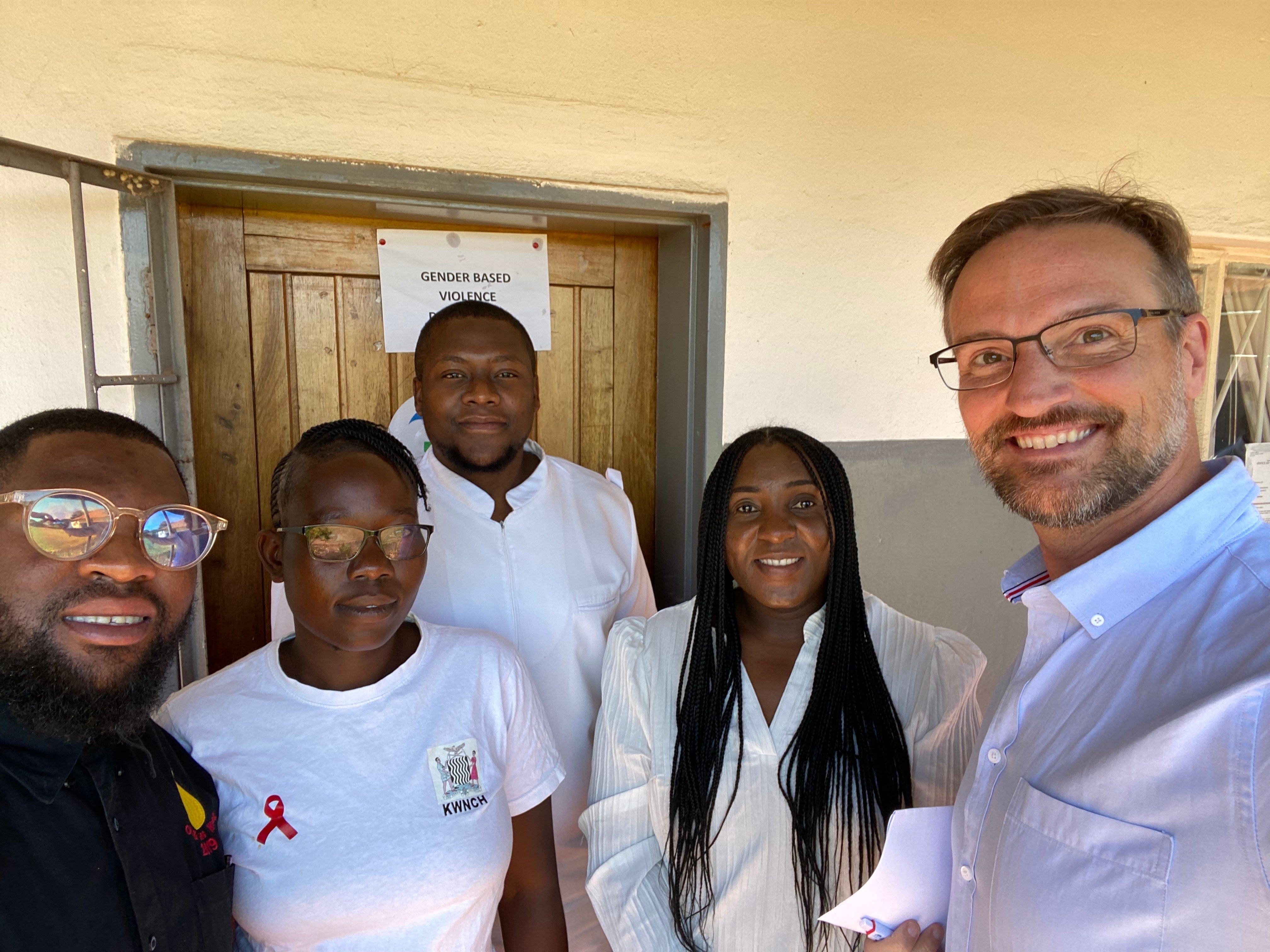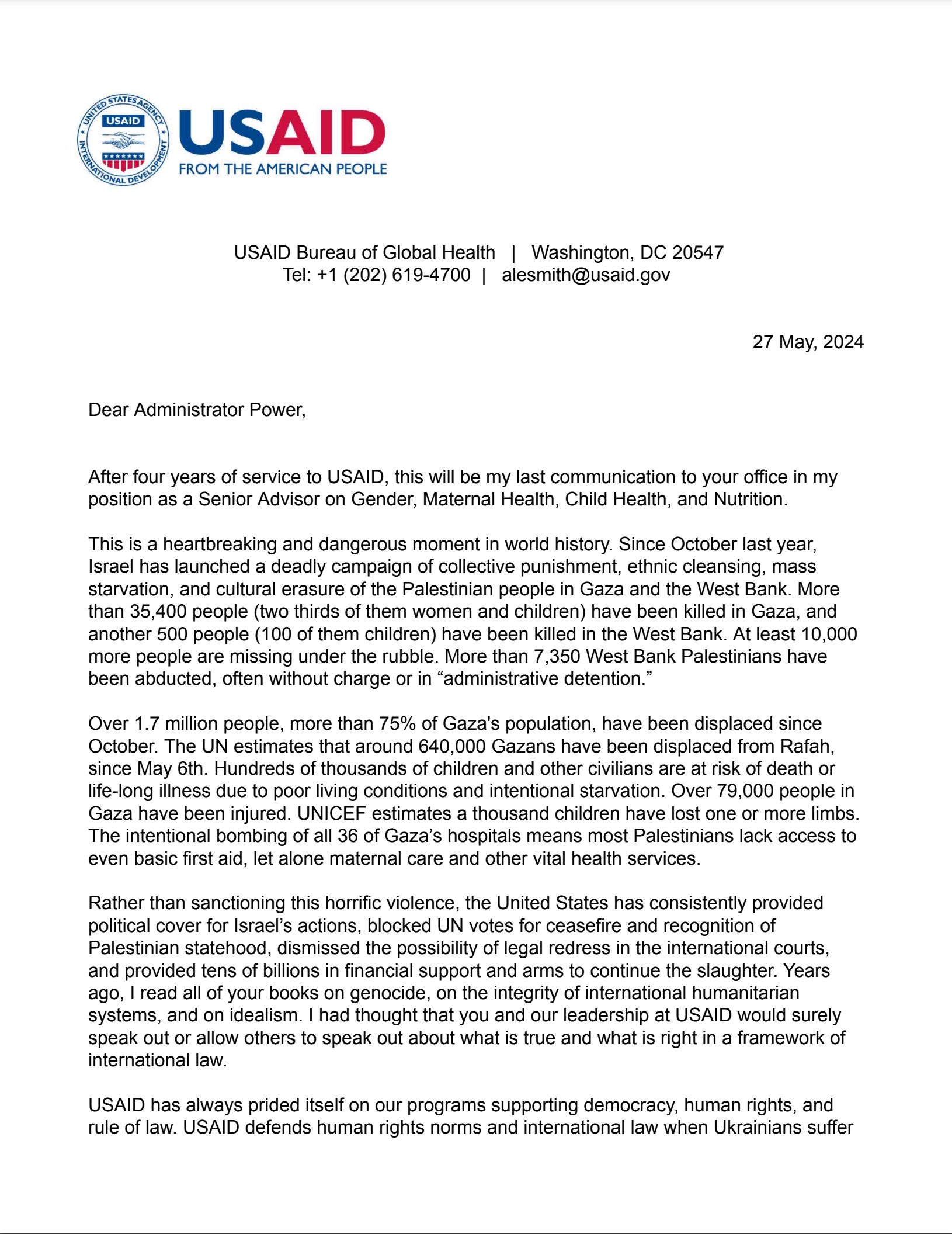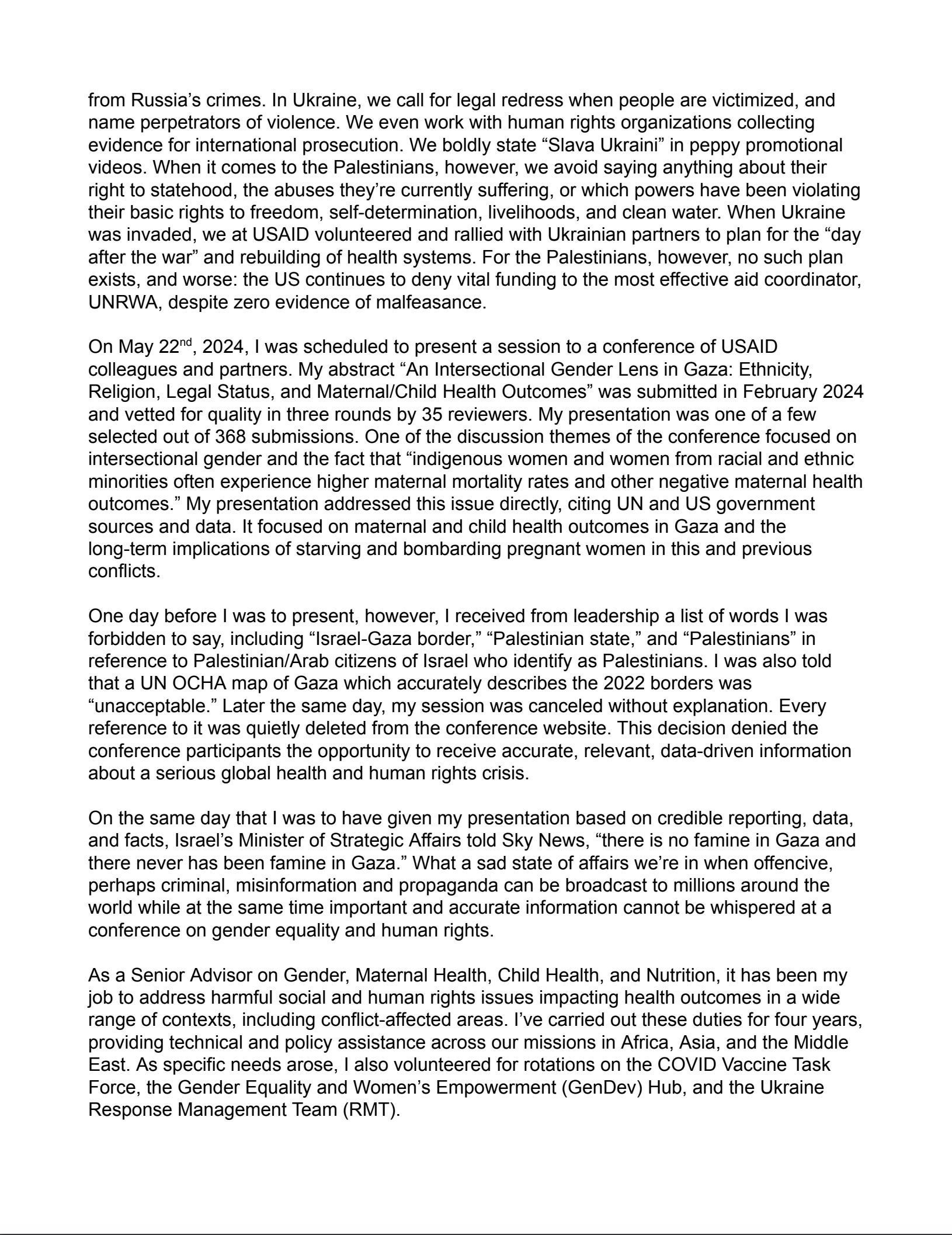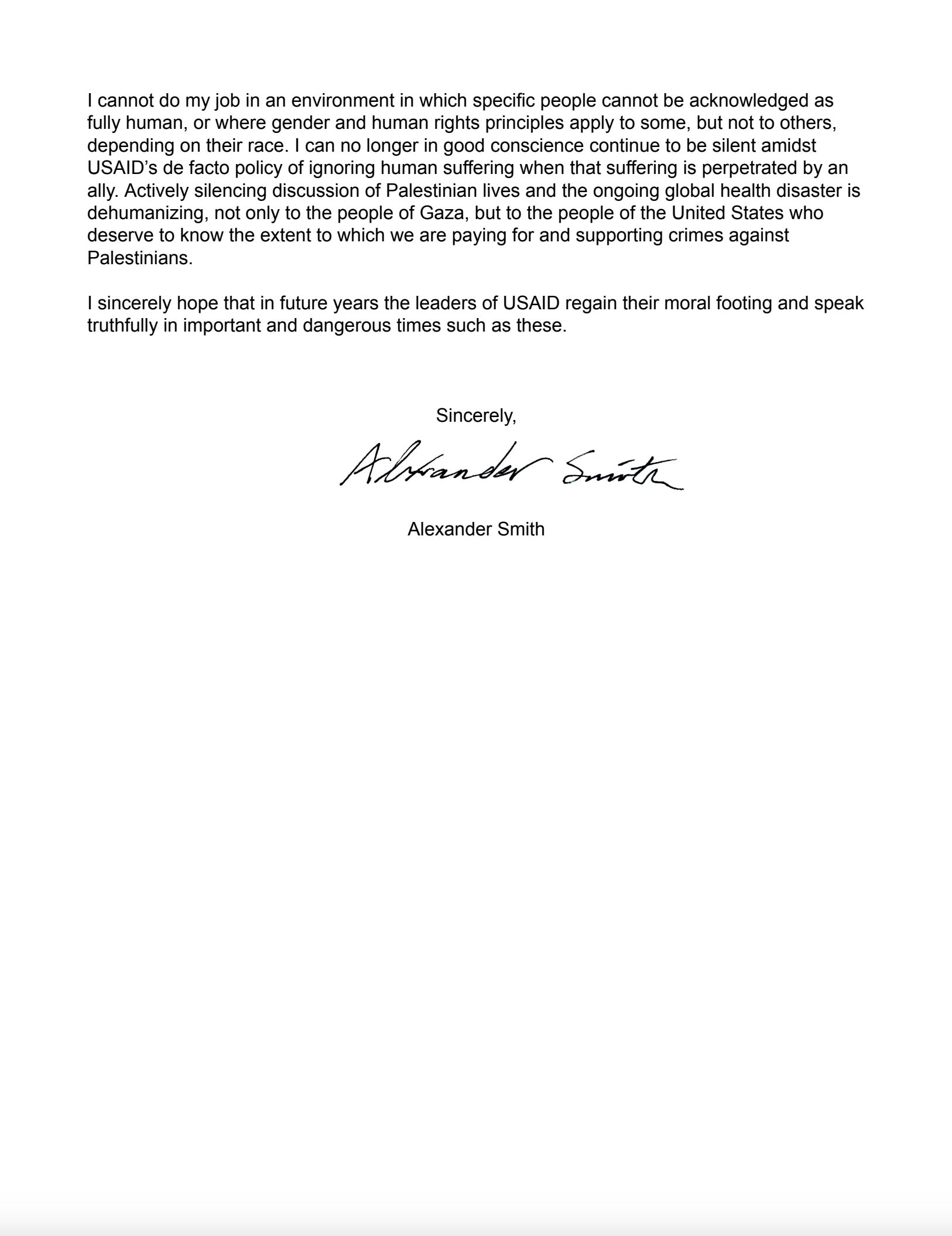Read in full: Resignation letter from US official who quit over Gaza war
Alex Smith, a US official who quit his role at the US Agency for International Aid this week, hit out at the head of the agency Samantha Power for failing to call out Israel for blocking humanitarian aid to Gaza.

A contractor with the US Agency for International Development (USAID) has resigned in protest over the Biden administration’s support for the war in Gaza — and in an interview with The Independent said that political pressure from the White House was silencing dissent at the agency.
Alex Smith, a senior adviser on gender, maternal health, child health, and nutrition, said he was given a choice of resigning or being fired after a presentation he was due to deliver on child mortality among Palestinians was cancelled by USAID leadership.
In his resignation letter to the head of USAID, Samana Power, he alleged that the agency was treating the war in Gaza and Palestinians differently than other conflicts and humanitarian emergencies.
Read his resignation letter in full below:



27 May, 2024
Dear Administrator Power,
After years of service to USAID, this will be my last communication to your office in my position as a Senior Advisor on Gender, Maternal Health, Child Health, and Nutrition.
This is a heartbreaking and dangerous moment in world history. Since October last year, Israel has launched a deadly campaign of collective punishment, ethnic cleansing, mass starvation, and cultural erasure of the Palestinian people in Gaza and the West Bank. More than 35,400 people (two thirds of them women and children) have been killed in Gaza, and another 500 people (100 of them children) have been killed in the West Bank. At least 10,000 more people are missing under the rubble. More than 7,350 West Bank Palestinians have been abducted, often without charge or in “administrative detention.”
Over 1.7 million people, more than 75% of Gaza’s population, have been displaced since October. The UN estimates that around 640,000 Gazans have been displaced from Rafah, since May 6th. Hundreds of thousands of children and other civilians are at risk of death or life-long illness due to poor living conditions and intentional starvation. Over 79,000 people in Gaza have been injured. UNICEF estimates a thousand children have lost one or more limbs. The intentional bombing of all 36 of Gaza’s hospitals means most Palestinians lack access to even basic first aid, let alone maternal care and other vital health services.
Rather than sanctioning this horrific violence, the United States has consistently provided political cover for Israel’s actions, blocked UN votes for ceasefire and recognition of Palestinian statehood, dismissed the possibility of legal redress in the international courts, and provided tens of billions in financial support and arms to continue the slaughter. Years ago, I read all of your books on genocide, on the integrity of international humanitarian systems, and on idealism. I had thought that you and our leadership at USAID would surely speak out or allow others to speak out about what is true and what is right in a framework of international law.
USAID has always prided itself on our programs supporting democracy, human rights, and rule of law. USAID defends human rights norms and international law when Ukrainians suffer from Russia’s crimes. In Ukraine, we call for legal redress when people are victimized, and name perpetrators of violence. We even work with human rights organizations collecting evidence for international prosecution. We boldly state “Slava Ukraini” in peppy promotional videos. When it comes to the Palestinians, however, we avoid saying anything about their right to statehood, the abuses they’re currently suffering, or which powers have been violating their basic rights to freedom, self-determination, livelihoods, and clean water. When Ukraine was invaded, we at USAID volunteered and rallied with Ukrainian partners to plan for the “day after the war” and rebuilding of health systems. For the Palestinians, however, no such plan exists, and worse: the US continues to deny vital funding to the most effective aid coordinator, UNRWA, despite zero evidence of malfeasance.
On May 22nd, 2024, I was scheduled to present a session to a conference of USAID colleagues and partners. My abstract “An Intersectional Gender Lens in Gaza: Ethnicity, Religion, Legal Status, and Maternal/Child Health Outcomes” was submitted in February 2024 and vetted for quality in three rounds by 35 reviewers. My presentation was one of a few selected out of 368 submissions. One of the discussion themes of the conference focused on intersectional gender and the fact that “indigenous women and women from racial and ethnic minorities often experience higher maternal mortality rates and other negative maternal health outcomes.” My presentation addressed this issue directly, citing UN and US government sources and data. It focused on maternal and child health outcomes in Gaza and the long-term implications of starving and bombarding pregnant women in this and previous conflicts.
One day before I was to present, however, I received from leadership a list of words I was forbidden to say, including “Israel-Gaza border,” “Palestinian state,” and “Palestinians” in reference to Palestinian/Arab citizens of Israel who identify as Palestinians. I was also told that a UN OCHA map of Gaza which accurately describes the 2022 borders was “unacceptable.” Later the same day, my session was canceled without explanation. Every reference to it was quietly deleted from the conference website. This decision denied the conference participants the opportunity to receive accurate, relevant, data-driven information about a serious global health and human rights crisis.
On the same day that I was to have given my presentation based on credible reporting, data, and facts, Israel’s Minister of Strategic Affairs told Sky News, “there is no famine in Gaza and there never has been famine in Gaza.” What a sad state of affairs we’re in when offencive, perhaps criminal, misinformation and propaganda can be broadcast to millions around the world while at the same time important and accurate information cannot be whispered at a conference on gender equality and human rights.
As a Senior Advisor on Gender, Maternal Health, Child Health, and Nutrition, it has been my job to address harmful social and human rights issues impacting health outcomes in a wide range of contexts, including conflict-affected areas. I’ve carried out these duties for four years, providing technical and policy assistance across our missions in Africa, Asia, and the Middle East. As specific needs arose, I also volunteered for rotations on the COVID Vaccine Task Force, the Gender Equality and Womenʼs Empowerment (GenDev) Hub, and the Ukraine Response Management Team (RMT).
I cannot do my job in an environment in which specific people cannot be acknowledged as fully human, or where gender and human rights principles apply to some, but not to others, depending on their race. I can no longer in good conscience continue to be silent amidst USAID’s de facto policy of ignoring human suffering when that suffering is perpetrated by an ally. Actively silencing discussion of Palestinian lives and the ongoing global health disaster is dehumanizing, not only to the people of Gaza, but to the people of the United States who deserve to know the extent to which we are paying for and supporting crimes against Palestinians.
I sincerely hope that in future years the leaders of USAID regain their moral footing and speak truthfully in important and dangerous times such as these.
Sincerely,
Alexander Smith
Join our commenting forum
Join thought-provoking conversations, follow other Independent readers and see their replies
Comments
Bookmark popover
Removed from bookmarks